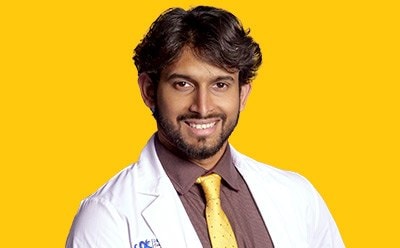Zarrar Nashman: My Next Great Impossible

Zarrar Nashman is a researcher at the University of Pennsylvania Health System and Harvard Medical School and an MD candidate at Drexel University College of Medicine. He gave us an insight into his team’s remarkable efforts to restore lost function from traumatic brain injuries through innovative techniques.
“…we aim to restore the function of damaged brain regions.”
Restoration of function in the central nervous system is of great interest within the scientific community, and brain organoids show tremendous potential in that area. We’ve observed that, when given specific growth factors and nutrients, brain organoids can become phenotypically similar to the brain regions we aim to repair.
Our previous studies have demonstrated that brain organoids can integrate into host animals following traumatic brain injuries. Using this property, we aim to restore the function of damaged brain regions. For example, if a patient loses the ability to walk normally, we hope to restore some of that functionality by introducing brain organoids to the damaged motor cortex.
“Some techniques tend to be risky but may be the only way to access deeper parts of the brain.”
Introducing organoids to a damaged brain region requires precise yet creative ways of accessing the area of interest. Some techniques tend to be risky but may be the only way to access deeper parts of the brain. I believe it’s acceptable to use novel techniques to access challenging brain areas. This approach would not only introduce brain organoids to recover critical functions but also pave the way for improved surgical techniques.
“…I would not mind spending extra time in the lab pursuing that idea.”
Brain organoid development is a time-consuming task as methods we develop to improve it (such as introducing other cell types into the organoid) risk introducing new sources of error. However, if there’s evidence that culturing organoids with a specific cell type could facilitate the recovery of brain function, I would not mind spending extra time in the lab pursuing that idea. Even if it falls outside my primary responsibilities, the time spent would be worth it. If the idea fails, it’s one less repeat that someone else has to undergo. In that sense, failure is just as valuable as success.
“…I believe that using differentiated brain organoids will become a novel therapy in this field..”
The fact that there are so many challenges still to be tackled in neuroscience keeps me striving for the next idea. We currently lack reliable remedies to reverse trauma and regenerate the central nervous system. In the future, I believe that using differentiated brain organoids will become a novel therapy in this field. In my opinion, a simple idea and the Next Great Impossible are fundamentally the same concept. The Next Great Impossible is just an idea that someone dared to experiment with and make into a reality.
FAQ
Q: What kind of mindset do you need to achieve the Next Great Impossible?
A: Never underestimate an idea solely because of its practicality.
如要继续阅读,请登录或创建帐户。
暂无帐户?